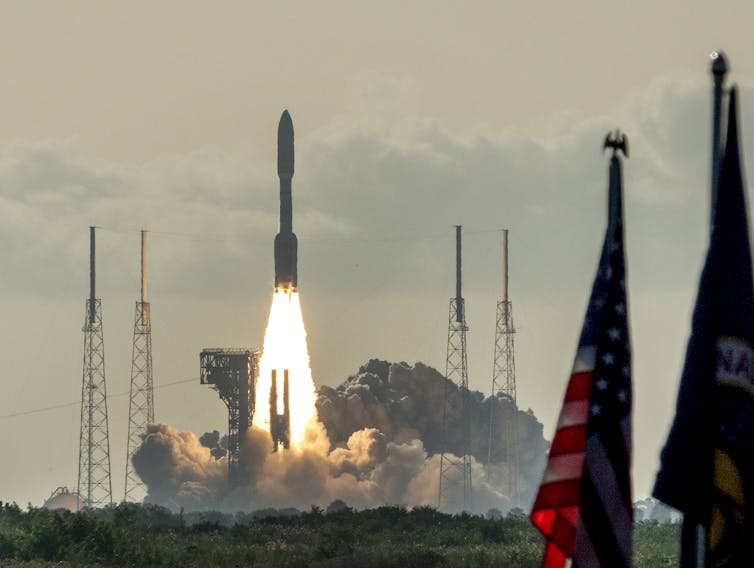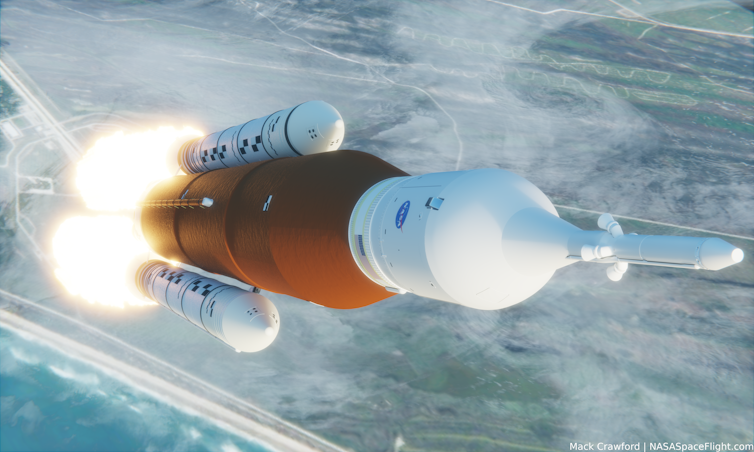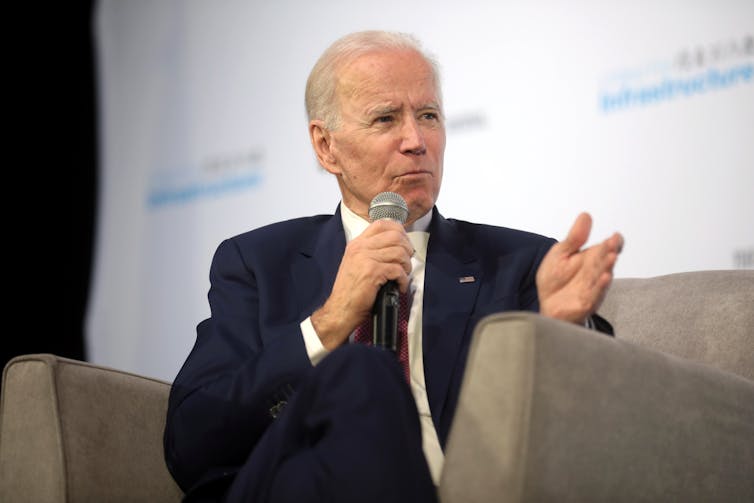Ian Whittaker, Nottingham Trent University and Gareth Dorrian, University of Birmingham
Donald Trump set bold goals for space exploration during his time in office – from crewed missions to the Moon and Mars to a Space Force. By contrast, his successor Joe Biden has been relatively quiet on space policy. So how is space exploration likely to change going forward?

It is clear is that there will be change. NASA’s current chief, Jim Bridenstine, has already announced he is stepping down. And we know that US human spaceflight policy rarely survives a change in presidency.
That said, the amazing success of the crewed SpaceX launch to the International Space Station (ISS), however, means the commercial crew programme is likely to keep running – taking the burden off NASA. Indeed, the first operational flight of the Crew Dragon by commercial company SpaceX is due for launch on November 14, with four astronauts bound for the ISS.
During the Trump administration, NASA also committed to the return of astronauts to the Moon in 2024 under the Artemis program. This is due for its first test launch (uncrewed) next year with Artemis-1. This builds on the Constellation program which was implemented by Republican president George W Bush in 2005 but was subsequently cancelled by Democratic president Barack Obama due to its high cost and difficulty.

The only substantial clue as to the direction of a Biden presidency with regard to astronaut flights to the Moon can be found in a document by the Democratic Party entitled “Building a Stronger, Fairer Economy”. In one paragraph, the Democrats state that they “support NASA’s work to return Americans to the Moon and go beyond to Mars, taking the next step in exploring our solar system.”
No detail is offered on possible timelines. But, with international cooperation now a major feature of the Artemis program, it would be difficult for a fledgling Biden administration to unilaterally withdraw from the project. For example, Canada, the European Space Agency and Japan are all formal partners in the construction of the Lunar Gateway – a lunar orbiting outpost designed to support multiple expeditions to the surface.
The programme is also rapidly advancing research, particularly in terms of building materials, power supplies and food production. Just this week, the European Space Agency awarded a contract to the British company Metalysis to develop techniques to simultaneously extract oxygen and metals from lunar soil.
The Trump administration also pushed for a first crewed mission to Mars in the 2030s – a much more difficult task due to the distances involved. The long journey would put astronauts at risk of high radiation exposure and psychological difficulties. Other huge challenges include weight restrictions and communication times.
An independent report by the Science and Technology Policy Institute in 2019 stated that a crewed Mars mission in the 2030s is currently unfeasible. It is unlikely Biden will try to resurrect this any time soon.
One of the more questionable implementations by the Trump administration was the formation of Space Force – a branch of the armed forced in space. The move highlights that the US views space as a potential war zone rather than a domain of purely scientific venture. But US citizens aren’t too impressed with the Space Force, mocking the logo and the uniforms. Indeed, the programme has public approval rating of only 31%.
So will it be scrapped? The disbanding of a branch of the armed forces has not been performed in the US before and there are doubtlessly many difficulties of reintegrating this back into the US Air Force. It is therefore likely to stay, possibly with reduced focus.
A fresh start for NASA?
Can we expect anything new? Biden has already pledged to sign executive orders that will undo most of the Trump administration’s work – in the same way that Trump undid most of Obama’s work.
The biggest indication of change is Bridenstine stepping down. When he was appointed in 2018, it was something of a surprise to the scientific community – he had no scientific qualifications and had previously indicated that he had doubts about climate change (which he changed his mind about when accepting the role). Yet he has proved to be an able leader of NASA.
On stepping down, he said he wanted to let somebody with a “close relationship with the president” take over. Who this might be is still a question, and will depend largely on the new president himself. Most heads of NASA have at least a degree in engineering or physics and, in the past, have headed a space centre. This makes Jody Singer (the director of Marshall Space Flight Center), Mark Geyer (the director of Johnson Space Center), or Dennis Andrucyk (the director of Goddard Space Flight Center) potential candidates, as well as the current deputy administrator James Morhard. The field is thought to be largely open, though.

Biden has made it clear that tackling the climate emergency is a priority. While this is likely to be focused on industrial pollution limits and renewable energy sources, it does suggest that space policy could be more focused on Earth observation missions, such as the GOES (Geostationary Operational Environmental Satellite) programme.
Potentially we could be looking at more satellites of this type; monitoring oil spills, deforestation and carbon emissions. All of these possibilities are of course overshadowed by the financial crisis caused by the COVID-19 pandemic. And, given that a sustained source of money to support long-term projects such as the Artemis program is vital to their success, it is probably a case of believing it when we see it.
Whatever the changes will be, it seems likely that there may be less funding for space missions. But, despite that, many scientists will be breathing a sigh of relief at the prospect of not having to fight the kind of anti-science tweets that we have seen from Trump during his time in office on topics ranging from Covid-19 and vaccinations to climate change.
Ian Whittaker, Senior Lecturer in Physics, Nottingham Trent University and Gareth Dorrian, Post Doctoral Research Fellow in Space Science, University of Birmingham
This article is republished from The Conversation under a Creative Commons license. Read the original article.












